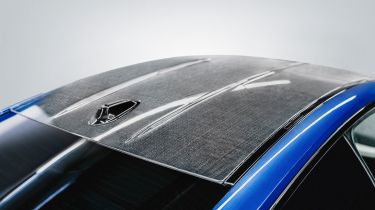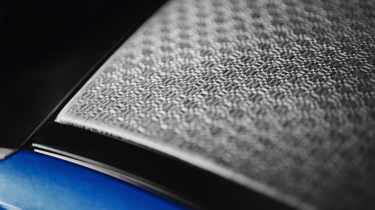BMW is killing carbon fibre to build its lightweight M cars from plants
Developed in collaboration a Swedish clean-tech firm, natural fibres are said to be just as strong and lightweight as carbon alternatives, plus more sustainable

BMW has developed an all-new material as a more sustainable replacement for carbon fibre, which is now ready for development and set to be used on production cars – including the new electric BMW M3 – within the next few years.
Engineered in collaboration with Swiss firm Bcomp, natural-fibre composites offer similar properties to their carbon-fibre counterparts, but emit far less CO2 throughout production. Plus they can be recycled, unlike most forms of carbon-based composites.
When developing such materials, the key issue was to ensure they are strong enough to be homologated for use on a car’s roof; BMW says that when applied to its next-generation performance car – which we assume means the forthcoming BMW M3 EV – the usage of natural fibre coincides within a reduction of CO2e (carbon dioxide equivalent) emissions by 40 per cent, compared with using carbon fibre. The company says it can also help cut the usage of plastic in the interior by up to 70 per cent, too.
In appearance, natural fibre looks very similar to its carbon counterpart, with a distinctive weave pattern designed to replicate leaf veins, as well as a dark-grey colour. In fact, it’s so similar that you may not have noticed it already being used on BMW’s racing cars, including the M4 GT4 and DTM.
As their name suggests, natural-fibre composites are made from materials such as plants or animal products. In this case, BMW and Bcomp’s material is constructed using flax (a flowering plant) fibres that are grown naturally and harvested in Europe.
The CEO of BMW M, Franciscus van Meel, said he was “delighted” by the recent breakthrough, describing the new material as a “vital element of innovative lightweight solutions in motorsport, allowing for a reduction in CO2e emissions in the manufacturing process”.

“We are now looking forward to the use of these materials in future BMW M product ranges,” he concluded.
This breakthrough comes at a vital time, after the European Union recently drafted legislation to classify carbon fibre as a “hazardous substance” as part of its ongoing End-of-Life Vehicles (ELV) Directive.
This is because when carbon fibre is disposed of, the tiny particles generated can be an irritant – and even harmful – when inhaled or exposed to human skin. Such particles are also conductive, so have the potential to short-circuit machinery.
However, thankfully for the automotive industry, the legislation remains at a draft stage, following the likes of Audi and Mercedes-AMG strongly submitting evidence against it. BMW also appealed to the EU, but the brand’s recent investment in alternative materials does suggest it may just be a matter of time before carbon fibre disappears altogether.
Now you can buy a car through our network of top dealers around the UK. Search for the latest deals…








